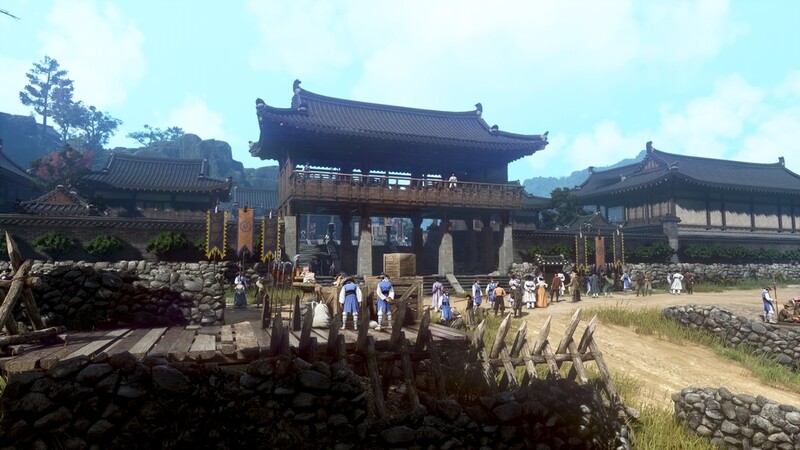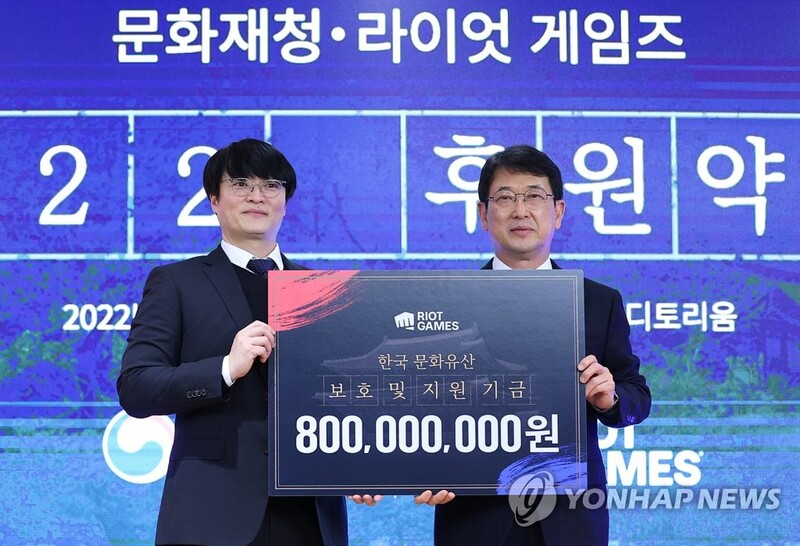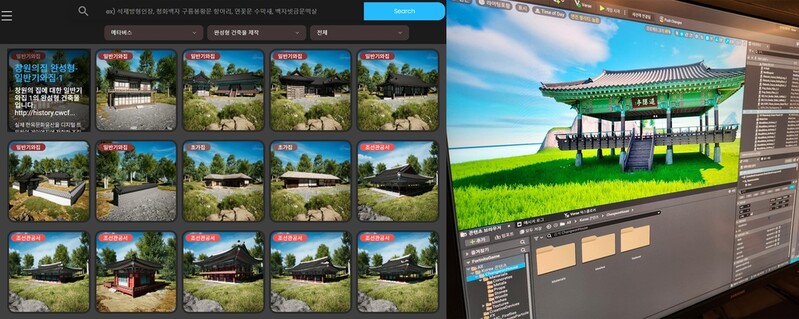 |
| ▲This photo, provided by Pearl Abyss show scene from 'Black Desert.' (PHOTO NOT FOR SALE) (Yonhap) |
 |
| ▲This photo, provided by NC Soft show scene from the trailer of 'Project E.' (PHOTO NOT FOR SALE) (yonhap) |
 |
| ▲This photo, shows ceremony between riot games and Cultural Heritage association. (Yonhap) |
 |
| ▲This photo, provided by KCISA show unreal engine. (PHOTO NOT FOR SALE) (yonhap) |
SEOUL April 8 (Yonhap) -- As awareness of Korean history and traditional culture increases worldwide, domestic game companies targeting the global market are interested in cultural assets.
According to the game industry on the Saturday, South Korean game development company Pearl Abyss updated its new continent, called "Morning Country," to the Korean server of their famous game "Black Desert.”
Unlike the "Black Desert" universe, which is set in a medieval fantasy-style world, "Morning Country" is a new area that combines the natural environment of the Korean Peninsula with traditional architecture, hanbok, and folk games.
The story consists of 15 various chapters featuring numbers of unique characters which appears in old folktales of Korea.
In the production process of "Morning Country," local governments with various state institutions and cultural assets, including the Cultural Heritage Administration, the National Museum of Museums, the Korea Tourism Organization, the National Palace Museum, and the National Folk Museum, played a large role.
Pearl Abyss signed a business agreement with the Cultural Heritage Administration last year and received data related to Joseon royal relics, intangible heritage, natural monuments, marine cultural heritage, and modern historical streets.
Vast amounts of cultural property data were actively used to depict Joseon Dynasty-style building styles and the costumes of characters in "The Kingdom of the Morning."
Pearl Abyss plans to update its "Morning Country" segment to North American and European markets soon, where the fan base of "Black Desert" are thick and stable.
In addition, the upcoming proect, "Goblin," will feature buildings and costumes based on Korean traditional culture.
NCsoft also signed a business agreement with the North Gyeongsang province Research Institute last month for the "digital restoration of Silla’s royal landscape" and decided to cooperate in producing digital content using cultural assets from the Silla period and to support digital scanning technology.
NCsoft addressed that this move is part of social contribution activities using content production technology and is not directly related to game production.
However, considering that NCsoft has released a trailer for “Project E”, which is a new game featuring palaces from Joseon Dynasty, mask dances, and warriors wearing battle armors from the certain era, it is possible that data accumulated through cultural heritage restoration activities will be used in the game production process.
Riot Games Korea, which is a subsidiary of the game development company well known for its game "League of Legends" signed an agreement with the Cultural Heritage Administration in 2012 to protect cultural properties and donated 7.6 billion won on a total of 11 occasions until 2022.
The amount sponsored by Riot Games contributed to the recovery of Korean cultural heritage leaked abroad, such as ▲ Sakyamuni Samjondo ▲ Hyomyeong Crown Prince Chaek ▲ Chinese Palace ▲ Baekja Idonggung Myeongmyeonggakho ▲ Cheokam Teacher's Collection Book ▲ Joseon Royal Borok.
Riot Games does not use cultural assets or traditional Korean culture to produce games, however it is more active than any other domestic gaming company in terms of enhancing its brand reputation and repaying fans through social contribution.
In 2015, an exhibition was held to unveil works depicting LoL's logos and characters in Korean painting style, and in 2020, moreover, Riot Games collaborated with Hanbok masters and Korean painting artists to produce the realistic looking hanbok for LoL character "Ari" with the motif of nine tailed fox, gumiho.
Starting this year, the game company started off a explore project for game users to showcase cultural heritages within Seoul South Korea.
The Korea Culture Information Service, an organization under the Ministry of Culture, Sports and Tourism, has been supporting the production of digital contents using various cultural assets.
The website of the "Cultural Public Data Square," which kicked off in 2016, is open to anyone to use the information regarding the cultural heritages such as images, 3D files, and databases of major national museums, including the National Museum of Korea.
On the April 7, Epic Games, collaborated with "Unreal Engine," on seven of the cultural property types and texture data, as well as data used for game by scanning traditional hanok in Changwon, Gyeongsangnam-do, built in the late 19th century, were released free of charge to game developers around the world.
An official from the Korea Cultural Information Service addressed, "We plan to provide more data related to traditional culture in the future so that it can be used for games or content production."
Regarding the growing trend of games using traditional culture and cultural heritage, Kim Jung-tae, a professor at Dongyang University teaching games, addressed, "The government's efforts to promote cultural assets through digital content and game companies' intentions to find new IPs by turning to Western-style fantasy or science fiction."
Continuing on professor stated "The recent success of movies, dramas, and K-POP has also contributed to the increase in interest in Korean culture around the world."
(This article is translated from Korean to English by Joonha Yoo)
(END)
(C) Yonhap News Agency. All Rights Reserved






















![[박스오피스] '만약에 우리' 200만 돌파…3주째 주말 1위](https://korean-vibe.com/news/data/20260126/yna1065624915992608_675.jpg)
